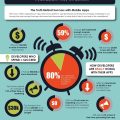7 Great Startup Success Stories You Need to Know
The Top 7 Startup Success Stories You Need to Know in 2024
As we step into the new year, the startup ecosystem is buzzing with excitement and anticipation. With numerous success stories emerging every day, it’s inspiring to see how innovative ideas, determination, and a bit of luck can transform the fortunes of individuals and industries alike. In this article, we’ll delve into seven remarkable startup success stories that have made headlines in recent years and continue to inspire entrepreneurs globally.
1. Airbnb – Revolutionizing the Way We Travel
Airbnb is one of those startups that has become synonymous with disruption and innovation. Founded by Brian Chesky and Joe Gebbia back in 2008, the idea was simple yet genius: provide travelers with an alternative to traditional hotels by connecting them directly with local hosts offering unique spaces for rent.
What started as a small venture with three air mattresses on a floor grew into a behemoth of the travel industry. By 2020, Airbnb had listed over 7 million properties in more than 191 countries and regions worldwide, changing the face of hospitality forever. The company’s success isn’t just about the numbers; it’s about how it has culturally shifted our perception of travel accommodation.
Key Takeaway: Even the most unconventional ideas can be game-changers if executed with passion and a clear vision.
2. Spotify – Making Music Accessible to All
Spotify, founded by Daniel Ek and Martin Lorentzon in 2006, has been the music lover’s best friend for over a decade now. What began as an attempt to combat piracy turned into a revolutionary streaming service that made high-quality music accessible with just a few clicks.
Spotify’s success can be measured not only by its user base (which exceeds 400 million active users) but also by how it has changed the way we consume music. It has given artists and labels new avenues for revenue, redefined the concept of playlists, and even influenced how new artists get discovered.
Key Takeaway: Adaptability to market needs and constant innovation can ensure a startup’s relevance in a rapidly changing landscape.
3. Stripe – Simplifying Online Payments
Stripe was founded by brothers Patrick and John Collison back in 2010 with the aim of making online payments easier, faster, and more secure for businesses. By providing an API that developers could integrate into their applications or websites, Stripe streamlined e-commerce transactions worldwide.
Today, Stripe is a leader in its space, serving thousands of businesses from startups to major corporations like Amazon and Google. Its success story is one of solving a complex problem with elegant simplicity, making it easier for companies to focus on growth rather than transactional hurdles.
Key Takeaway: Solving real-world problems can lead to remarkable success, especially when done in a user-friendly manner.
4. Warby Parker – Redefining the Eyewear Market
Warby Parker shook up the eyewear industry by providing stylish, affordable glasses with home try-ons and a socially responsible business model. Founded in 2010 by Neil Blumenthal and Dave Gilboa, the company’s mission was to make fashion eyewear accessible while donating a pair for every one sold.
With over $1.2 billion valuation and thousands of customers worldwide, Warby Parker has demonstrated that combining style with social responsibility can be both financially rewarding and impactful. Its innovative approach has expanded beyond just eyeglasses to eye exams and insurance as well, making it a full-service player in the space.
Key Takeaway: Merging a compelling product offering with corporate social responsibility can resonate deeply with consumers.
5. Zoom – Revolutionizing Remote Meetings
Zoom’s meteoric rise during the pandemic is one of the most impressive startup stories in recent history. Founded by Eric Yuan in 2011, what started as an enterprise-focused video conferencing tool became an essential service for remote work and personal connections alike.
With its user-friendly interface, high-quality calls, and feature-rich meetings experience, Zoom went from being a relatively unknown entity to a household name within months, reaching over 400 million daily meeting participants at its peak. Its success story is about timing, execution, and the ability to pivot effectively in response to global shifts.
Key Takeaway: Being ready to capitalize on emerging trends can catapult a startup into stratospheric success.
6. Slack – The Future of Workplace Communication
Slack transformed how teams communicate by introducing a platform that was both playful and professional. Founded in 2009 by Stewart Butterfield, the initial aim was to create a game, which eventually morphed into an innovative communication tool for workplaces.
Today, with thousands of integrations and millions of users across the globe, Slack is synonymous with team collaboration. Its acquisition by Salesforce for $27 billion marked one of the most significant tech acquisitions in history, underscoring its influence on modern work culture.
Key Takeaway: Sometimes, pivoting from your original idea can lead to something far more impactful.
7. Instacart – Delivering Groceries and Opportunity
Instacart, founded by Apoorva Mehta, Max Mullen, and Brandon Leonardo in 2012, has disrupted the grocery shopping experience with same-day delivery of fresh produce, meat, dairy products, and other essentials.
By partnering with local stores, Instacart not only provided a solution to busy lifestyles but also created economic opportunities for personal shoppers. Its success is evident in its valuation, exceeding $18 billion, and its presence across thousands of cities in the U.S. and Canada.
Key Takeaway: Offering convenience without sacrificing quality can lead to immense customer loyalty and business growth.
These startup success stories encapsulate various themes that are crucial for any aspiring entrepreneur: innovation, adaptability, problem-solving, and a keen understanding of consumer needs. As we navigate through 2024, these examples serve as beacons of inspiration and guidance, reminding us that the next big thing could very well emerge from the most unlikely or unconventional idea.








